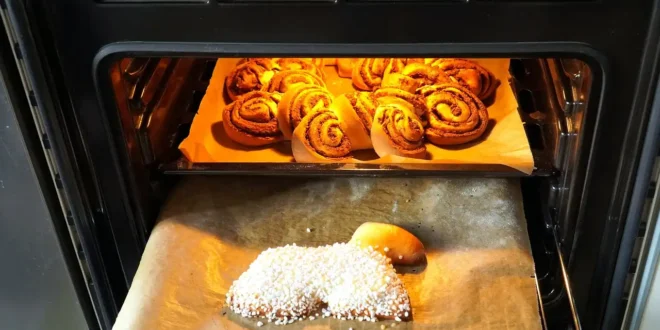Attention all artisan bakers and bakery owners! Are you struggling to choose the right commercial bakery oven for your business?
An oven is not only a tool; it’s the heart of your bakery, where all the magic happens. From crispy crusts to soft, fluffy interiors, the right oven can elevate your baking to new heights.
In this guide, we will explore the key factors to consider when selecting a commercial bakery oven. Get ready to transform your baking techniques and delight your customers with mouth-watering treats!
Understanding Your Baking Needs
When selecting a commercial bakery oven, assessing your baking requirements is crucial. This assessment involves a detailed evaluation of several key aspects:
Type of Baked Goods
Your choice of oven largely depends on what you’ll be baking. Each type of baked product has unique requirements. For instance, artisan breads might need a deck oven for the perfect crust, while pastries might fare better in a convection oven for even heat distribution.
Baking Volume
The amount of baking you’ll be doing is also a critical factor. You might not need a large oven system if you’re supplying a small café or bakery.
Conversely, high-volume baking, like that for a large restaurant or a bakery with extensive distribution, requires an oven with greater capacity and efficiency.
Space Considerations
The size of your kitchen or baking area influences the size and type of oven you can accommodate. Larger ovens or oven systems with multiple components require more space than the ones in smaller kitchens.
Consistency and Quality
Depending on your brand and your customers’ expectations, the consistency and quality of the baked products are paramount. Certain ovens provide more precise temperature control and even baking.
Specialty Baking Needs
If you are an artisan baker or have specific baking techniques, your oven must support these. Features like steam injection or specialized baking trays might be necessary for achieving the desired results.
Frequency of Use
Consider how often the oven will be in use. Frequent, heavy use demands a more durable, high-performance oven that can withstand the rigors of a busy baking schedule.
Future Expansion
If you plan to expand your bakery or diversify your menu, choose an oven to accommodate this growth. Flexibility and scalability in an oven system are advantageous for adapting to changing business needs.
By taking the time to understand your specific baking needs, you can make an informed decision when choosing a commercial bakery oven. These considerations ensure that your investment meets your current requirements and supports your bakery’s growth and success.
Types of Commercial Bakery Ovens
Each type of commercial oven caters to specific baking needs, from artisan breads to large-scale production. The most common types include deck, convection, and rack ovens.
Deck Ovens
Deck ovens are a favorite among artisan bakers. They are known for their excellent heat retention, which is essential for baking bread with a crispy crust and soft interior. Here’s why deck ovens stand out:
- Heat Distribution: They use conduction, radiation, and convection to bake bread evenly
- Steam Control: Many deck ovens have built-in steam capabilities, which are vital for crust development
- Versatility: Suitable for various bread types, from classic baguettes to hearty sourdoughs
- Temperature Control: Each deck has its temperature settings, allowing for different bread types to be baked simultaneously
Convection Ovens
Convection ovens are the go-to for many bakeries due to their versatility and efficiency. They are perfect for pastries and lighter baked goods. Their key features include the following:
- Even Baking: Hot air circulates, reducing hot spots and ensuring uniform baking
- Speed: They bake faster than traditional ovens, which increases productivity
- Energy Efficiency: Convection ovens are often more energy-efficient, which lowers operational costs
- Size Options: Available in various sizes, they can fit in smaller kitchens or larger bakery spaces
Rack Ovens
For bakeries that handle high-volume baking, rack ovens are a practical choice. They accommodate multiple baking trays at once, offering consistency and efficiency. Their advantages are:
- Capacity: Large baking capacity is ideal for commercial operations
- Uniform Baking: The rotating racks ensure that all items bake evenly
- Versatility: Capable of baking a wide range of products, not just bread
- Space-Efficient: Despite their capacity, rack ovens maximize space
Choosing the Right Oven
When choosing between these ovens, consider your bakery’s specific needs. Artisan bakers might prefer the crust quality from a deck oven, while a busy commercial bakery could benefit from the efficiency of a rack oven. A convection oven is often the best choice for versatility and even baking.
Remember, the right commercial bakery oven is a significant investment in your bakery’s success. It influences the quality of your baked goods and the efficiency of your baking processes.
Consider factors like the types of bread you’ll bake, your production volume, and your kitchen’s layout when deciding. With the right oven, you can ensure every loaf, pastry, or cake you bake meets your standards and delights your customers.
Size and Space Considerations
Space is a key consideration when selecting a commercial bakery oven. It’s essential to measure your available space accurately.
Consider the oven’s physical dimensions and factor in additional room for ventilation and operation. A larger oven might seem appealing for increased production, but you must balance size with the available space in your bakery.
Also, a larger oven could mean higher energy consumption, which impacts your operating costs. Think about your daily output needs and how the oven will fit into your existing layout. Remember, an oven that’s too large or small can hinder your bakery’s efficiency.
Temperature Control and Consistency
Achieving uniform baking results hinges on precise temperature control. Opt for a commercial bread oven with easy-to-manage temperature settings and reliable thermostats.
Modern ovens may feature advanced systems, such as programmable baking profiles. These allow you to customize the baking process for different products, ensuring each batch is perfectly cooked.
Consistent temperature control is essential for artisan bakers, who often rely on specific heat settings to achieve their bread’s desired crust and texture.
Energy Efficiency and Cost
An energy-efficient oven reduces your carbon footprint and helps save on electricity bills. Examine the oven’s energy ratings and choose a model that balances optimal baking performance and energy consumption.
While high-quality commercial bakery ovens might come with a higher initial cost, they often lead to significant long-term savings. These savings come in the form of reduced energy bills and lower maintenance costs.
Also, investing in a durable and efficient oven system contributes to the sustainability of your bakery business.
Maintenance and Durability
Investing in a commercial bakery oven is a long-term commitment, making durability and maintenance vital factors to consider. Opt for an oven crafted from superior materials known for their resilience and ability to withstand the rigors of frequent baking. Brands with a strong reputation for longevity should be at the top of your list.
Regular maintenance plays a crucial role in the performance and lifespan of your oven. Establish a routine maintenance schedule to ensure your oven functions at its best.
This maintenance schedule includes the following:
- Regular cleaning
- Checking for wear and tear
- Timely repairs
Remember, a well-maintained oven lasts longer and ensures consistent baking quality.
Additional Features
Modern commercial bakery ovens offer a range of additional features that can improve your baking process. Look for features such as:
- Steam Injection: Essential for achieving a perfect crust on bread and enhancing texture and flavor
- Rotating Shelves: Promote even baking and consistent results, which is especially important for large batches
- Viewing Windows: Allows you to monitor the baking process without opening the oven
- Temperature Probes: These sensors provide real-time internal temperature readings of your baked goods
- Programmable Controls: Programmable controls allow you to set specific baking profiles for different products
These additional features improve the quality of your baked goods and make the baking process more efficient and enjoyable.
Restaurant Equipment Considerations
For restaurants, the oven is a key component of the larger kitchen ecosystem. Your commercial bakery oven must integrate well with other restaurant equipment.
Be sure to consider the following:
- Space: Ensure the oven fits comfortably in your kitchen without disrupting the flow of operations
- Workflow: The oven should complement the kitchen’s workflow and enhance the ease of use
- Menu Compatibility: Choose an oven that can accommodate the specific baking needs of your restaurant’s menu
By carefully considering these factors, you can select a commercial bakery oven that not only meets your baking needs but also enhances the overall functionality and efficiency of your restaurant kitchen.
Find Your Ideal Commercial Bakery Oven
Choosing the best commercial bakery oven is a critical decision that can impact the quality of your baked goods and the success of your bakery. Consider your baking needs, the type of oven, size, temperature control, energy efficiency, maintenance, and additional features to find the perfect oven for your bakery.
Thank you for reading our guide on selecting the best commercial bakery oven. We hope you found it informative and helpful in making your decision.
Remember, the right oven can elevate your baking and delight your customers. Be sure to check out our other content on various insightful topics.
 SlushWeb Live the Way You Love
SlushWeb Live the Way You Love



